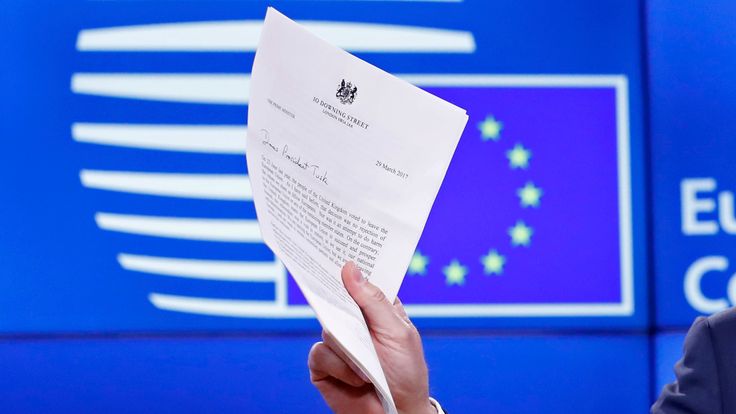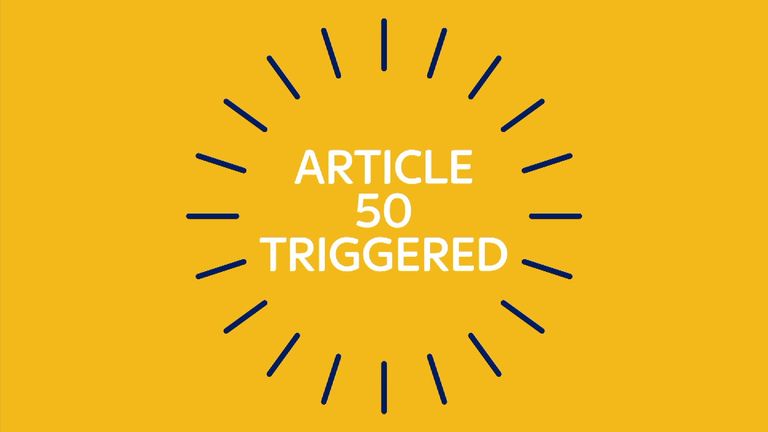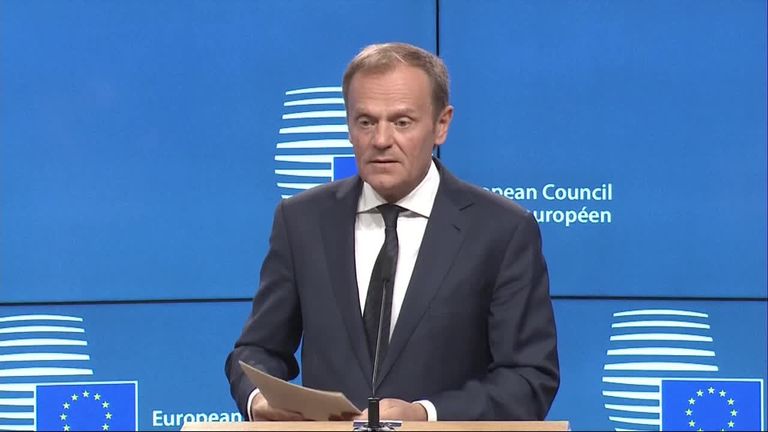Brexit: What clues does Theresa May鈥檚 Article 50 letter give us?

Wednesday 29 March 2017 16:17, UK
By Robert Nisbet, Senior Political Correspondent
Our Senior Political Correspondent breaks down the Prime Minister's Article 50 letter, looking at what messages it is trying to send to EU leaders - and how those messages will be received in Brussels.
Theresa May: On 23 June last year, the people of the United Kingdom voted to leave the European Union.
As I have said before, that decision was no rejection of the values we share as fellow Europeans. Nor was it an attempt to do harm to the European Union or any of the remaining member states. On the contrary, the United Kingdom wants the European Union to succeed and prosper.
Instead, the referendum was a vote to restore, as we see it, our national self-determination. We are leaving the European Union, but we are not leaving Europe - and we want to remain committed partners and allies to our friends across the continent.
Robert Nisbet: The PM starts by establishing the democratic mandate for Brexit and is conciliatory in tone. She's making it clear no one benefits from a war of attrition, and that the EU isn't Europe, just as Europe isn't the EU.
TM: Earlier this month, the United Kingdom Parliament confirmed the result of the referendum by voting with clear and convincing majorities in both of its Houses for the European Union (Notification of Withdrawal) Bill. The Bill was passed by Parliament on 13 March and it received Royal Assent from Her Majesty The Queen and became an Act of Parliament on 16 March.
Today, therefore, I am writing to give effect to the democratic decision of the people of the United Kingdom. I hereby notify the European Council in accordance with Article 50(2) of the Treaty on European Union of the United Kingdom's intention to withdraw from the European Union.
In addition, in accordance with the same Article 50(2) as applied by Article 106a of the Treaty Establishing the European Atomic Energy Community, I hereby notify the European Council of the United Kingdom's intention to withdraw from the European Atomic Energy Community. References in this letter to the European Union should therefore be taken to include a reference to the European Atomic Energy Community.
RN: Now she sets out the legislative 'tick-tock' - in diplomatic-speak - and pulls the trigger, with economy of language. This isn't the place for emotion, but clarity: the formal language of international law.
TM: This letter sets out the approach of Her Majesty's Government to the discussions we will have about the United Kingdom's departure from the European Union and about the deep and special partnership we hope to enjoy - as your closest friend and neighbour - with the European Union once we leave. We believe that these objectives are in the interests not only of the United Kingdom but of the European Union and the wider world too.
RN: Back to the emollient tone - "your closest friend and neighbour" - as she sets out the tone and broad brushstrokes of the UK negotiating strategy.
TM: It is in the best interests of both the United Kingdom and the European Union that we should use the forthcoming process to deliver these objectives in a fair and orderly manner, and with as little disruption as possible on each side. We want to make sure that Europe remains strong and prosperous and is capable of projecting its values, leading in the world, and defending itself from security threats.
We want the United Kingdom, through a new deep and special partnership with a strong European Union, to play its full part in achieving these goals. We therefore believe it is necessary to agree the terms of our future partnership alongside those of our withdrawal from the European Union.
RN: An appeal for calm and rationality: let's park our hubris and come to a deal which works for us all and avoids disruption.
TM: The Government wants to approach our discussions with ambition, giving citizens and businesses in the United Kingdom and the European Union - and indeed from third countries around the world - as much certainty as possible, as early as possible.
I would like to propose some principles that may help to shape our coming discussions, but before I do so, I should update you on the process we will be undertaking at home, in the United Kingdom.
RN: The PM is saying she wants to achieve as much certainty as possible - this is obviously aimed at Brussel's concerns over the status of EU nationals in the UK. More structure follows - setting out what the UK is up to before picking up the red paintbrush to draw some lines.
TM: As I have announced already, the Government will bring forward legislation that will repeal the Act of Parliament - the European Communities Act 1972 - that gives effect to EU law in our country. This legislation will, wherever practical and appropriate, in effect convert the body of existing European Union law (the "acquis") into UK law.
This means there will be certainty for UK citizens and for anybody from the European Union who does business in the United Kingdom. The Government will consult on how we design and implement this legislation, and we will publish a White Paper tomorrow. We also intend to bring forward several other pieces of legislation that address specific issues relating to our departure from the European Union, also with a view to ensuring continuity and certainty, in particular for businesses.
We will of course continue to fulfil our responsibilities as a member state while we remain a member of the European Union, and the legislation we propose will not come into effect until we leave.
RN: This sets out the constitutional path the UK Government now starts to walk: the repeal of the European Communities Act (which took us in) and a raft of legislation to prise us apart. She seeks to convince them that we will be full members until we leave (ie the "four freedoms" will still apply).
TM: From the start and throughout the discussions, we will negotiate as one United Kingdom, taking due account of the specific interests of every nation and region of the UK as we do so.
When it comes to the return of powers back to the United Kingdom, we will consult fully on which powers should reside in Westminster and which should be devolved to Scotland, Wales and Northern Ireland. But it is the expectation of the Government that the outcome of this process will be a significant increase in the decision-making power of each devolved administration.
RN: A well-aimed stiletto at the SNP - the UK will speak for the devolved nations. But an olive branch too: the nations will get more devolved oomph when powers are repatriated from Brussels.
TM: The United Kingdom wants to agree with the European Union a deep and special partnership that takes in both economic and security cooperation. To achieve this, we believe it is necessary to agree the terms of our future partnership alongside those of our withdrawal from the EU.
RN: The first big mention of security. Clearly the PM thinks turning off the tap of information-sharing is a better threat than turning the UK into a "low-tax, low-regulation" economy to steal investment. Again, note the use of this "deep and special partnership" (keep repeating it enough, the PM hopes, and they may start to believe you).
TM: If, however, we leave the European Union without an agreement the default position is that we would have to trade on World Trade Organisation terms. In security terms a failure to reach agreement would mean our cooperation in the fight against crime and terrorism would be weakened.
In this kind of scenario, both the United Kingdom and the European Union would of course cope with the change, but it is not the outcome that either side should seek. We must therefore work hard to avoid that outcome.
RN: The big negotiating punch: if you don't play ball we're happy with no deal and falling back on World Trade Organisation rules. That's the hardest of hard Brexits: automatic tariffs and a break in automatic sharing of security information. "Not the outcome either side should seek," she understates.
TM: It is for these reasons that we want to be able to agree a deep and special partnership, taking in both economic and security cooperation, but it is also because we want to play our part in making sure that Europe remains strong and prosperous and able to lead in the world, projecting its values and defending itself from security threats. And we want the United Kingdom to play its full part in realising that vision for our continent.
RN: More "deep and special". They really think this phrase will resonate. Again more sugar with the medicine: we want a strong Europe as it keeps us all safe (playing on security concerns, yet again).
TM: Looking ahead to the discussions which we will soon begin, I would like to suggest some principles that we might agree to help make sure that the process is as smooth and successful as possible.
i. We should engage with one another constructively and respectfully, in a spirit of sincere cooperation. Since I became Prime Minister of the United Kingdom I have listened carefully to you, to my fellow EU Heads of Government and the Presidents of the European Commission and Parliament. That is why the United Kingdom does not seek membership of the single market: we understand and respect your position that the four freedoms of the single market are indivisible and there can be no "cherry picking".
We also understand that there will be consequences for the UK of leaving the EU: we know that we will lose influence over the rules that affect the European economy. We also know that UK companies will, as they trade within the EU, have to align with rules agreed by institutions of which we are no longer a part - just as UK companies do in other overseas markets.
RN: Respectful and sincere cooperation is an attempt to lance the EU boil, that we want to "cherry pick" our access to the single market. The shorthand: we're off, we're out, and we know the consequences. Those mean that if we want access to the single market, we will have to adhere to rules we will have no role in creating.
ii. We should always put our citizens first. There is obvious complexity in the discussions we are about to undertake, but we should remember that at the heart of our talks are the interests of all our citizens. There are, for example, many citizens of the remaining member states living in the United Kingdom, and UK citizens living elsewhere in the European Union, and we should aim to strike an early agreement about their rights.
RN: This is a big deal: Theresa May saying she wants an "early agreement" about the rights of UK citizens in the EU and vice versa. But will she accept these have to be agreed before we talk trade?
iii. We should work towards securing a comprehensive agreement. We want to agree a deep and special partnership between the UK and the EU, taking in both economic and security cooperation. We will need to discuss how we determine a fair settlement of the UK's rights and obligations as a departing member state, in accordance with the law and in the spirit of the United Kingdom's continuing partnership with the EU. But we believe it is necessary to agree the terms of our future partnership alongside those of our withdrawal from the EU.
RN: Here's that "deep and special" phrase again before that other HUGE sticking point: how much, if anything, we will have to pay to get out of the Union. "We will need to discuss" it she says, but the "alongside" other discussions will stick in the EU's craw.
iv. We should work together to minimise disruption and give as much certainty as possible. Investors, businesses and citizens in both the UK and across the remaining 27 member states - and those from third countries around the world - want to be able to plan. In order to avoid any cliff-edge as we move from our current relationship to our future partnership, people and businesses in both the UK and the EU would benefit from implementation periods to adjust in a smooth and orderly way to new arrangements. It would help both sides to minimise unnecessary disruption if we agree this principle early in the process.
RN: First use of the phrase "cliff-edge" and how an "implementation period" would help both sides. This will be a big sticking point: the UK wants to throw off the oversight of the European Court of Justice - will the Brexiteers kick up a fuss if we're still governed by an EU court for months, even years, after we leave?
v. In particular, we must pay attention to the UK's unique relationship with the Republic of Ireland and the importance of the peace process in Northern Ireland. The Republic of Ireland is the only EU member state with a land border with the United Kingdom. We want to avoid a return to a hard border between our two countries, to be able to maintain the Common Travel Area between us, and to make sure that the UK's withdrawal from the EU does not harm the Republic of Ireland. We also have an important responsibility to make sure that nothing is done to jeopardise the peace process in Northern Ireland, and to continue to uphold the Belfast Agreement.
RN: The Irish question is mentioned explicitly (I understood there was consternation amongst some in the European Council that the UK Government was seemingly cavalier about the impact on Ireland). Wants to protect the 'soft' border.
vi. We should begin technical talks on detailed policy areas as soon as possible, but we should prioritise the biggest challenges. Agreeing a high-level approach to the issues arising from our withdrawal will of course be an early priority. But we also propose a bold and ambitious Free Trade Agreement between the United Kingdom and the European Union. This should be of greater scope and ambition than any such agreement before it so that it covers sectors crucial to our linked economies such as financial services and network industries. This will require detailed technical talks, but as the UK is an existing EU member state, both sides have regulatory frameworks and standards that already match. We should therefore prioritise how we manage the evolution of our regulatory frameworks to maintain a fair and open trading environment, and how we resolve disputes. On the scope of the partnership between us - on both economic and security matters - my officials will put forward detailed proposals for deep, broad and dynamic cooperation.
RN: An acknowledgement that the EU wants to settle other matters before it turns to a new Free Trade Agreement. The thrust of the PM's argument is that the FTA shouldn't take as long as TTIP (with the US) or CETA (with Canada) because we share "regulatory frameworks and standards".
vii. We should continue to work together to advance and protect our shared European values. Perhaps now more than ever, the world needs the liberal, democratic values of Europe. We want to play our part to ensure that Europe remains strong and prosperous and able to lead in the world, projecting its values and defending itself from security threats.
RN: The line brought jeers of derision from the Liberal Democrats in the House of Commons, as the PM pulled the trigger, but it's a diplomatic hug: we want to work with you together to defeat populism and protectionism.
We recognise that it will be a challenge to reach such a comprehensive agreement within the two-year period set out for withdrawal discussions in the Treaty. But we believe it is necessary to agree the terms of our future partnership alongside those of our withdrawal from the EU. We start from a unique position in these discussions - close regulatory alignment, trust in one another's institutions, and a spirit of cooperation stretching back decades. It is for these reasons, and because the future partnership between the UK and the EU is of such importance to both sides, that I am sure it can be agreed in the time period set out by the Treaty.
The task before us is momentous but it should not be beyond us. After all, the institutions and the leaders of the European Union have succeeded in bringing together a continent blighted by war into a union of peaceful nations, and supported the transition of dictatorships to democracy. Together, I know we are capable of reaching an agreement about the UK's rights and obligations as a departing member state, while establishing a deep and special partnership that contributes towards the prosperity, security and global power of our continent.
RN: Understatement of the document: "it will be a challenge" to reach the agreement. Again the Government stresses it wants concurrent - not sequential - talks on the divorce and trade, before ending with another use of that "deep and special" phrase and the observation that the letter is "momentous".
Essentially, the PM is saying: We're doing it, so let's stay pals and not break each other in the process. But if you're determined to punish us, your security and prosperity could be put at risk. We are prepared to walk away and take the consequences, but that would damage us all.





